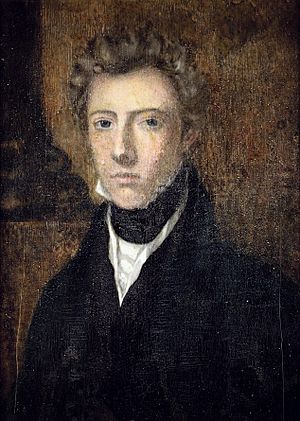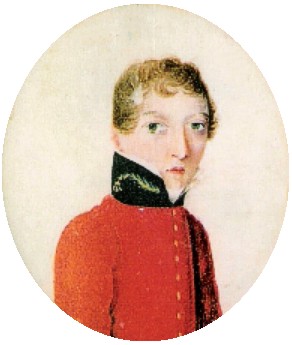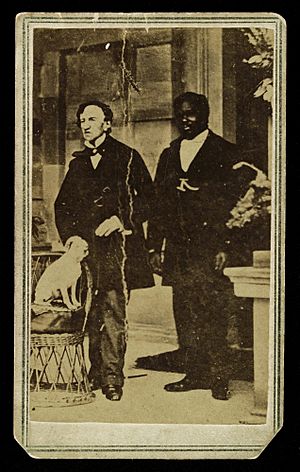James Barry (surgeon) facts for kids
Quick facts for kids
James Barry
|
|
|---|---|

Portrait claimed to be of Barry, c. 1820s
|
|
| Born |
Margaret Anne Bulkley
c. 1789 |
| Died | 25 July 1865 (aged 75–76) London, England
|
| Other names | James Miranda Steuart Barry |
| Alma mater | University of Edinburgh Medical School |
| Occupation | Surgeon |
| Known for | Medical reforms, first successful Caesarean section in Africa |
| Relatives | James Barry (painter) (uncle) |
James Barry (born Margaret Anne Bulkley, c. 1789 – 25 July 1865) was a skilled military surgeon in the British Army. Barry was born in Cork, Ireland. After studying medicine at the University of Edinburgh Medical School, Barry worked in many parts of the British Empire, including Cape Town, South Africa.
Barry became an Inspector General, a very high medical position in the British Army. Barry made many important improvements for soldiers and local people. Barry also performed the first successful Caesarean section in Africa where both the mother and baby survived.
James Barry lived as a man throughout adult life to become a surgeon. Barry's birth name was Margaret Anne Bulkley and was known as female in childhood. The public and military friends only learned Barry's biological sex after death.
Contents
Early Life and Education
There is not much information about James Barry's early life. Most details come from a few letters. Researchers believe Barry was born in Cork in 1789. This date is based on a letter from Barry's mother, Mrs. Bulkley, who said her child was fifteen in 1805.
Barry's birth name was Margaret Anne. Barry was the second child of Jeremiah and Mary Anne Bulkley. Mary Anne Bulkley's brother was James Barry, a famous artist. The family faced money problems.
In 1804, when Barry was about fifteen, Mary Anne and Barry moved to London. They hoped to get help from Professor James Barry, but he refused. However, when Professor Barry died in 1806, he left some money. This, plus help from his friends, made life easier for Mrs. Bulkley and the teenager.
A plan was made for Barry to study medicine. This plan involved Barry, Mary Anne Bulkley, and some of Professor Barry's friends. These friends included General Francisco de Miranda and Dr. Edward Fryer. The University of Edinburgh was chosen for medical school.
On November 30, 1809, Margaret Anne Bulkley became James Barry. Barry pretended to be the nephew of the late Professor James Barry. A letter Barry sent to the family's lawyer, Daniel Reardon, helped confirm this secret later. Barry asked for letters for Margaret Bulkley to be sent to "my aunt" (Mary Anne Bulkley). Barry also wrote that it was helpful for "Mrs Bulkley (my aunt) to have a Gentleman to take care of her."
Becoming a Doctor
Barry started studying at the University of Edinburgh Medical School in November 1809. Barry looked very young, with a short height and a high voice. Because of this, the University Senate first tried to stop Barry from taking the final exams.
However, the Earl of Buchan, a friend of Dr. Fryer, helped. He convinced the Senate to let Barry take the exams. Barry earned a medical degree (Medicinae Doctor) in 1812.
After Edinburgh, Barry moved to London. Barry studied at Guy's and St Thomas' Hospitals. On July 2, 1813, Barry passed the exam for the Royal College of Surgeons of England. This meant Barry was now a qualified surgeon.
A Career in Medicine
James Barry joined the British Army as a Hospital Assistant on July 6, 1813. Barry worked in Chelsea and Plymouth. On December 7, 1815, Barry was promoted to Assistant Surgeon to the Forces, like a lieutenant.
Work in South Africa
In 1816, Barry was sent to Cape Town, South Africa. Barry became friends with the Governor, Lord Charles Somerset. Barry successfully treated Lord Charles's sick daughter. This led to a close friendship, and Barry became the Governor's personal doctor.
In 1822, Barry was given a big job: Colonial Medical Inspector. This was a huge step up for Barry's rank. Over ten years in the Cape, Barry made many important changes. These included improving sanitation and water systems. Barry also worked to better the lives of enslaved people, prisoners, and those with mental illness. Barry even helped create a safe place for people with leprosy.
Barry performed one of the first successful Caesarean sections where both mother and baby survived. The baby was named James Barry Munnik in Barry's honor. This name was passed down, even to a future Prime Minister of South Africa, J. B. M. Hertzog. Barry often criticized local officials, but the friendship with the Governor helped smooth things over.
Later Postings and Promotions
Barry was promoted to Surgeon to the Forces on November 22, 1827. Barry then served in Mauritius in 1828. In 1829, Barry returned to England without permission to treat Lord Charles Somerset, who was ill. Barry stayed until Somerset died in 1831.
Next, Barry was posted to Jamaica and then to Saint Helena in 1836. In St Helena, Barry was arrested and faced a court-martial for "conduct unbecoming of an Officer." However, Barry was found not guilty.
In 1840, Barry went to the Leeward Islands and Windward Islands in the West Indies. Here, Barry focused on improving conditions for troops. Barry was promoted to Principal Medical Officer. In 1845, Barry got yellow fever and returned to England for sick leave.
After recovering, Barry was sent to Malta in 1846. In 1850, Barry helped deal with a cholera epidemic.
In 1851, Barry was posted to Corfu. Barry was promoted to Deputy Inspector-General of Hospitals on May 16. This rank was like a lieutenant colonel. In 1857, Barry went to Canada. Barry became Inspector General of Hospitals, similar to a Brigadier General.
Wherever Barry served, conditions improved. Barry worked to better sanitation, food, and medical care for soldiers, prisoners, and people with leprosy. Barry was very upset by suffering and often argued with officials to demand changes. This sometimes led to Barry being arrested or demoted.
Barry had modern ideas about health, being a vegetarian and teetotal. Barry was also very fond of pets, especially a poodle named Psyche. Barry had a servant named John, who stayed with Barry until death.
Later Life and Death
James Barry was forced to retire from the army on July 19, 1859, because of old age and poor health. Barry died from dysentery in London on July 25, 1865.
After Barry's death, a woman who cleaned Barry's home claimed that Barry was biologically female. She also said Barry had marks that suggested Barry had given birth. However, no official medical check was done to confirm this.
This information became public and was discussed in letters between George Graham of the General Register Office and Dr. D. R. McKinnon, Barry's doctor. Dr. McKinnon had known Barry for many years and never suspected Barry was female. He wrote that he thought Barry might be "an imperfectly developed man."
Many people who knew Barry were surprised by the news. The British Army tried to keep the story quiet. They sealed all records about Barry for 100 years. Historian Isobel Rae later accessed these records in the 1950s. She confirmed that the painter James Barry was indeed Barry's uncle. Barry was buried in Kensal Green Cemetery.
Gender Identity and Public Life
In a letter written at age 19, Barry said: "Was I not a girl I would be a Soldier!" This shows an early interest in a life not typically open to women at the time.
Barry's interest in medicine was likely encouraged by friends of the late Professor James Barry. Just before starting medical school in 1809, Barry began living as a man. Barry's small size, high voice, and smooth skin made some people think Barry was a very young boy. Barry kept this male identity through medical training and joining the British Army. At that time, officers did not need a medical exam.
Barry was known for being direct, impatient, and argumentative. However, Barry was also praised for a good "bedside manner" and excellent medical skills. Barry's strong personality led to a pistol duel with Captain Josias Cloete. Barry's shot hit Cloete's military cap.
During the Crimean War (1854–1856), Barry had a famous argument with Florence Nightingale. After Barry's death, Nightingale wrote about the harsh scolding she received from Barry. She later learned Barry was a woman.
Barry always made sure no one was in the room while undressing. Barry also gave strict instructions that if Barry died, no one should examine the body. Barry wanted to be buried in bed sheets without any further inspection.
See also
 In Spanish: James Barry para niños
In Spanish: James Barry para niños



